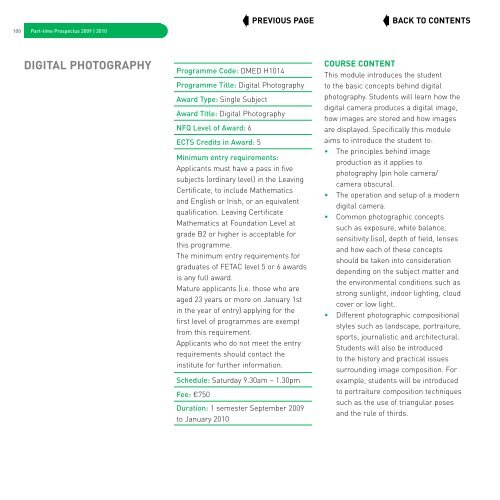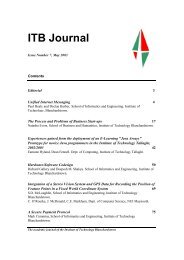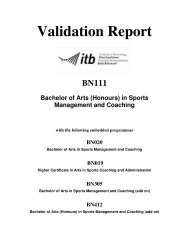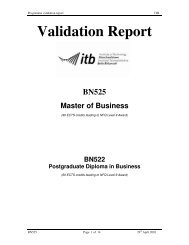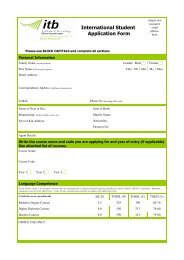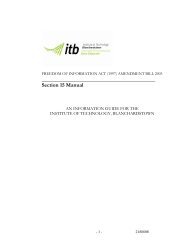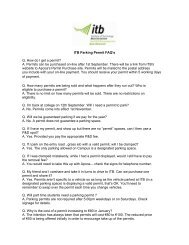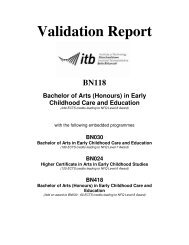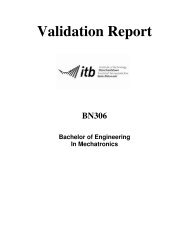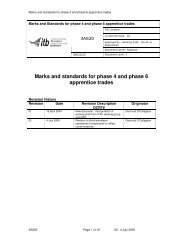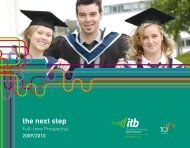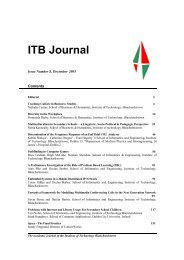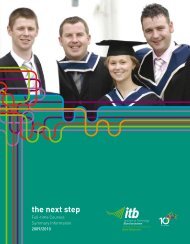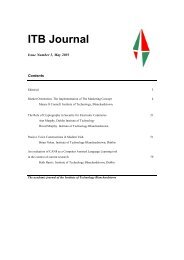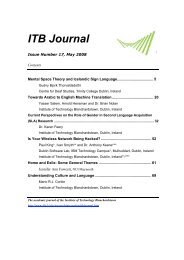new horizons - Institute of Technology Blanchardstown
new horizons - Institute of Technology Blanchardstown
new horizons - Institute of Technology Blanchardstown
Create successful ePaper yourself
Turn your PDF publications into a flip-book with our unique Google optimized e-Paper software.
Previous Page BAck to Contents Next Page ➧<br />
BAck to Contents<br />
100 Part-time Prospectus 2009 | 2010<br />
Creative Digital Media Courses 101<br />
DIGITAL PHOTOGRAPHY<br />
Programme Code: DMED H1014<br />
Programme Title: Digital Photography<br />
Award Type: Single Subject<br />
Award Title: Digital Photography<br />
NFQ Level <strong>of</strong> Award: 6<br />
ECTS Credits in Award: 5<br />
Minimum entry requirements:<br />
Applicants must have a pass in five<br />
subjects (ordinary level) in the Leaving<br />
Certificate, to include Mathematics<br />
and English or Irish, or an equivalent<br />
qualification. Leaving Certificate<br />
Mathematics at Foundation Level at<br />
grade B2 or higher is acceptable for<br />
this programme.<br />
The minimum entry requirements for<br />
graduates <strong>of</strong> FETAC level 5 or 6 awards<br />
is any full award.<br />
Mature applicants (i.e. those who are<br />
aged 23 years or more on January 1st<br />
in the year <strong>of</strong> entry) applying for the<br />
first level <strong>of</strong> programmes are exempt<br />
from this requirement.<br />
Applicants who do not meet the entry<br />
requirements should contact the<br />
institute for further information.<br />
Schedule: Saturday 9.30am – 1.30pm<br />
Fee: €750<br />
Duration: 1 semester September 2009<br />
to January 2010<br />
COURSE CONTENT<br />
This module introduces the student<br />
to the basic concepts behind digital<br />
photography. Students will learn how the<br />
digital camera produces a digital image,<br />
how images are stored and how images<br />
are displayed. Specifically this module<br />
aims to introduce the student to:<br />
• The principles behind image<br />
production as it applies to<br />
photography (pin hole camera/<br />
camera obscura).<br />
• The operation and setup <strong>of</strong> a modern<br />
digital camera.<br />
• Common photographic concepts<br />
such as exposure, white balance,<br />
sensitivity (iso), depth <strong>of</strong> field, lenses<br />
and how each <strong>of</strong> these concepts<br />
should be taken into consideration<br />
depending on the subject matter and<br />
the environmental conditions such as<br />
strong sunlight, indoor lighting, cloud<br />
cover or low light.<br />
• Different photographic compositional<br />
styles such as landscape, portraiture,<br />
sports, journalistic and architectural.<br />
Students will also be introduced<br />
to the history and practical issues<br />
surrounding image composition. For<br />
example, students will be introduced<br />
to portraiture composition techniques<br />
such as the use <strong>of</strong> triangular poses<br />
and the rule <strong>of</strong> thirds.<br />
• Basic image workflow and<br />
manipulation s<strong>of</strong>tware. Students will<br />
learn how to store and catalogue their<br />
digital images, carry out basic image<br />
manipulation activities such adjusting<br />
exposure, contrast, colour saturation,<br />
image size/quality/cropping and some<br />
basic effects such as applying sepia<br />
tone and conversion to black and white.<br />
WHO SHOULD ATTEND?<br />
This course is suitable for those with an<br />
interest in photography, as well as those<br />
who wish to use it as part <strong>of</strong> a wider<br />
interest in Digital Media.<br />
APPLICATION<br />
For further details and an application<br />
form please contact the marketing team<br />
on 01 885 1000 or e-mail: info@itb.ie.


